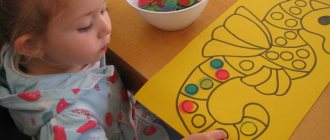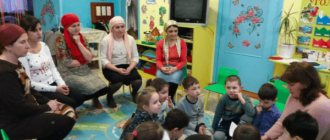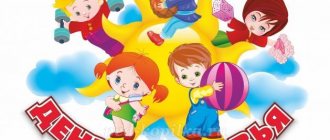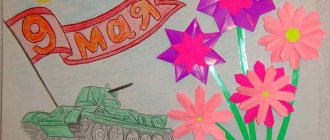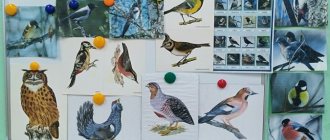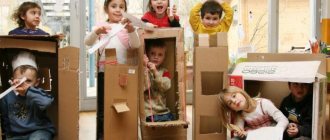In the preparatory group, the topics considered annually are summarized; children summarize previously studied material, which in elementary school will serve as the basis for new knowledge. The study of the topic “Victory Day” in the preparatory group, as in previous years, is given a week on the eve of the holiday. For these days, a calendar plan is drawn up, specifying the goals and objectives of mastering the topic dedicated to May 9.
- 2 Key principles for creating a theme week plan
- 3 A selection of plans for the thematic week “Victory Day” in the preparatory group
The essence of drawing up a plan for the thematic week “Victory Day” for the preparatory group
The main purpose of drawing up a weekly calendar plan is to select and combine methods and techniques for working with children in the context of studying the theme of the Great Victory. In addition, the plan allows you to:
- determine forms of interaction with children to systematize previously studied material;
- make a list of elements for creating a subject-development environment that would facilitate the study of the topic (for example, decorations for a matinee, portraits of family members of students for the implementation of the “Immortal Regiment” project, etc.).
The “Immortal Regiment” campaign can be carried out jointly with younger preschool children, that is, included in the plans of different age groups
The objectives of drawing up a plan are:
- consistent distribution of thematic material across all methods of organizing the educational process, for example, for a matinee organized in the format of the “Immortal Regiment” action, preparation begins with organizing a conversation on the topic “My family and the Second World War”, and continues with the design of a portrait of a relative who participated in the war at the GCD artistic and aesthetic direction;
- formulating the goals of organizing different types of activities so that they relate to each other - for example, during a speech development class, children play the word game “Name the Proverb” (connecting parts of proverbs on the topic of war, military service), and on an excursion to the local museum, looking at front-line photographs, select a suitable expression with folk wisdom for each card;
- a brief indication of the essence of a particular type of activity (from the stages of GCD to an explanation of the course of the game);
- combining types of activities in accordance with the sequence of presentation of the material - during the excursion (real or virtual), the children get acquainted with fellow countrymen-heroes of the war, and then at the NOD for speech development they talk about their relatives who participated in the Second World War.
Conducting thematic weeks promotes deep understanding of the topic
Planning for the week “Victory May is marching across the country”
Author: Evdokimova Elena Nikolaevna, teacher of the 1st category of MBDOU No. 26 “Rosinka”, Korolev.
Planning educational work in the middle group
Topic of the week: “Victorious May is sweeping across the country”
Goal: to introduce children to the holiday of May 9 and the heroes who defended our Motherland during the Second World War, monuments dedicated to the heroes of the Second World War; to cultivate a sense of patriotism, love for the Motherland, pride in the Russian people, respect for veterans of the Great Patriotic War.
Final event: Thematic leisure “Victory Day”.
| Theme: “Victorious May is marching across the country” | |||||
| Day of the week | Educational activities | Joint activities between adults and children | Independent activities of children | Joint activities with family | |
| 1 floor day | 2nd floor day | ||||
| Monday | 1. The child and the world around him "Victory Day" Goals: to give children an idea of the Victory Day; learn to talk, answer questions; cultivate a sense of patriotism. 1. Physical training while walking According to the plan of the physical education instructor | Reading the poem “Victory Day” by N. Tomilina Children listen to the poem, the teacher’s explanations and answer questions. | Listening to the song “Festive Fireworks” (Music by L.A. Fetisova). Answers to questions: What holiday is this song dedicated to? Who are we congratulating on this holiday? | Examination of thematic albums, photographs about hero cities, WWII veterans, children of war heroes, military equipment. | Visual information for parents, posters, booklets, reminders about instilling pride in your country, about instilling respect for WWII veterans. |
| Tuesday | 1.FEMP Goals: will strengthen the ability to compare sets of objects using chips, the ability to count a certain number of objects from a set. 2.Music according to the music director's plan | Looking at the album “Children are War Heroes” and talking about their exploits. Foster a sense of patriotism. | Riddles about military equipment. Guessing riddles. | Create conditions for productive activity (coloring pictures of military equipment). | Invite parents to a holiday dedicated to Victory Day (at a preschool educational institution). Invite parents and their children to attend a Victory Day rally at the memorials of our city. |
| Wednesday | 1.Speech development/Reading “Story by L. Kassil “Monument to the Soviet Soldier” Goals: to teach listening to a work of art, to form an idea of the heroism of soldiers - defenders of the Motherland"; cultivate interest in historical events related to their native country. 2.Physical education According to the plan of the physical education instructor | Reading and memorizing T. Belozerov’s poem “May Holiday! | D/exercise “Guess and count” Using the example of military equipment (tanks, planes, ships), correlate the number and quantity of objects. | ||
| Thursday | 1.Applique/Design "Paper Plane" Goals: teach children to work with paper using the origami technique; develop attention and perception. 2.Physical education According to the plan of the physical education instructor | Conversation with children on the topic “Defenders of the Motherland”, “Soldiers, pilots, sailors...” | Games with sticks. Construction of a star, flag, tank from counting sticks. | Create conditions for role-playing games “We are military”, “Hospital”. | Involve parents in landscaping the kindergarten site. |
| Friday | 1.Music according to the music director's plan 2.Drawing "Bouquet of lilacs" Goal: to enhance children’s knowledge about the Second World War; develop artistic taste, spatial perception, imagination, hard work; promote the development of fine motor skills; cultivate a sense of patriotism. | Conversation “Lilac Bush”. Activate children's knowledge about shrubs (lilac). Examination of lilacs (color, shape, aroma). Reading of K. Chichikov’s poem “Salute”. | Thematic leisure time “Victory Day”. To consolidate the idea of the heroism of soldiers - defenders of the Motherland, to enhance children's knowledge about the Second World War | ||
Save the information and bookmark the site - press CTRL+D
Read further:
- Planning the educational process in the middle group for a week
- Summary of the final event “Winter's Tale” for children 3-4 years old
- Final event for children 6-7 years old in the form of a game
- Final work “Development of the content of an event with parents”
- Long-term plan for the week on the topic “Security”
- Long-term planning in preschool educational institutions, senior group
- Planning work with children for the summer health period
- Intellectual game “Clever and smart girls” (event summary)
How can you increase a person’s heart rate at home?
Key principles for creating a theme week plan
To organize the process of considering the topic of the week, it is important for a teacher working with children of any age not to miss the following points:
- the teaching load must correspond to the age of the pupils - therefore, even the most fascinating story on the topic with games and creative tasks on the GCD must fit within the established norms for the duration of classes in the preparatory group - 30 minutes;
- materials for work should be selected taking into account the general level of development of the children in the group;
- joint and independent activities should alternate;
- the plan should include all types of organization of educational activities - educational activities, matinees, special moments, project development, for example, in the format of publishing a wall newspaper;
- the plan should reflect the integration of educational areas (cognition, speech development, physical, social-communicative, artistic and creative development);
- the presentation of the material should be based on the level of performance of the pupils - for example, the topic “Children at War” in the morning is implemented in the form of an educational activity with a story about the children’s feat, and in the afternoon, during independent work, a drawing on the topic “Children of the Regiment”;
- correlation with the thematic plan is also a prerequisite for drawing up a plan for the thematic week - that is, the implementation of the tasks set by the educational program, in particular, repetition of key aspects of the topic (main battles, names of commanders, names of major memorials, etc.).
The calendar plan for the thematic week includes all types of educational activities
Calendar and thematic planning in the preparatory group on the topic: “Year of Memory and Glory”
Author: Glavinskaya Olga Sergeevna
teacher of MADOU No. 72
Calendar and thematic planning in the preparatory group on the topic: “Year of Memory and Glory”
Calendar and thematic planning in the preparatory group
on the topic: “Year of Memory and Glory”
Completed by: Educator: Glavinskaya Olga Sergeevna Republic
Komi city Syktyvkar MADO No. 72
| month | Work with children | Working with parents | Organization of a developing subject-spatial environment | |
| September | 1.week | Game exercise “We are soldiers.” Objectives: To improve children’s ability to form a column in twos, threes, head alignment. Perform openings in a column with outstretched arms forward, turns to the right, left, stepping in a circle, jumping. | Collecting waste and natural materials for crafts | |
| 2.week | Construction from waste material “Truck”. Origami – “Airplane”. | Waste material, illustrations | ||
| 3.week | Examination of Vasnetsov’s painting “At the Outpost” Purpose: To give basic ideas about the defenders of the Fatherland, the epic heroes: Ilya Muromets, Alyosha Popovich, Dobrynya Nikitich | Illustration of Vasnetsov’s painting “At the Outpost” | ||
| 4.week | Conversation “What is heroism” Goal: To form children’s idea of heroism. To cultivate an emotionally positive, effective attitude towards soldiers, the desire to imitate them in agility, endurance, and courage. | |||
| October | 1.week | GCD communication Topic: “This Victory Day” - Consolidate knowledge about how the Russian people defended their Motherland during the war, how people preserve the memory of them. Foster respect for veterans of the Great Patriotic War. | Tell children at home about relatives who served in World War II | Pictures about war |
| 2.week | Coloring page "Military guys". Goal: ability to paint carefully, development of color perception. | Coloring books, pencils | ||
| 3.week | L. Kasil “Battering Ram” A story about the heroes of the Soviet Union D. Minaev Yu. Smirnov A.I. Poyuschev. | |||
| 4.week | Examination of the painting “Brest Fortress” Purpose: To enrich children’s ideas about the history of their people. | Memo for parents “Teach your children about the war” | Illustration of the painting “Brest Fortress” | |
| november | 1.week | Origami - creating a model of a tank. — expand children’s understanding of military transport | ||
| 2.week | Examination of the illustrations “Road of Life”, “Piskarevskoe Memorial Cemetery”, “Broken Ring of the Blockade” Purpose: to maintain a conscious interest in the historical past of our country, to promote the formation of a sense of pride in the defenders of the Fatherland. | illustrations | ||
| 3.week | Reading stories from Shorygina’s book “For Children about the Great Victory.” Goal: to develop the ability to listen to new works, follow the development of action, and empathize with the characters. | |||
| 4.week | Didactic games: “Choose a uniform for a soldier and a sailor” | Did. material | ||
| December | 1.week | Examination of the landscapes of modern St. Petersburg, Moscow, as well as the city during the Second World War; Construction (from large parts of the “Builder” constructor: buildings, bridges, roads | Lego set Illustrations, diagrams | |
| 2.week | Reading S.P. Alekseev “Victory will be ours!” Goal: familiarization with the content, understanding the meaning of words. | |||
| 3.week | Military equipment coloring page. Goal: ability to paint carefully, development of color perception. | coloring pages | ||
| 4.week | Riddles "Military equipment". Goal: development of logical thinking. | |||
| January | 1.week | |||
| 2.week | Reading stories about the War. | |||
| 3.week | С\р game "Sailors" - improve the ability to unite in the game, distribute roles | Attributes for a role-playing game | ||
| 4.week | Conversation “Residents of Leningrad during the war.” | Pictures on the theme of the Great Patriotic War | ||
| February | 1.week | GCD The world around us “Victory Day” goal: to clarify and expand ideas about the Great Patriotic War, to cultivate respect for the memory of victorious soldiers. T.N. Vostrukhina p.131 | Advice for parents: what to read to children about the history of Russia, its soldiers and the Second World War. | Pictures on the theme of the Great Patriotic War |
| 2.week | Reading fiction: A. Mityaev “Why is the Army dear to everyone” Goal: to develop the ability to holistically perceive a literary text in the unity of content | Exhibition of creative works by students “Our Army” | ||
| 3.week | Military sports festival “Scouts and sailors”. Tasks: practice running a race; consolidate knowledge about military professions (intelligence officer, sailor); activate the names of military paraphernalia “Snipers” in speech | Participation of dads in a sports festival | Sport equipment | |
| 4.week | Independent activities of children in employment centers. Games with Lego constructors - construction of various military vehicles - expand children's ideas about military transport | Lego set Illustrations, diagrams | ||
| March | 1.week | “The streets of our city are named after them.” Goal: to expand children's understanding of famous people of our city. | Follow-up work: Home task, read with children about one of the famous people of our city | Photo portraits of famous fellow countrymen |
| 2.week | S/r game Hospital - prepare the environment for the game, select objects and attributes, choose a convenient place. “Construction” - Reconstruction of the city - agree on the theme, distribute roles, prepare the necessary attributes. | Attributes for a role-playing game | ||
| 3.week | View illustrations, postcards, medals, orders of the war years, photographs about life in besieged Leningrad | Involvement in compiling the album “Victory Day” | Illustrative material, album “Victory Day” | |
| 4.week | ORS enrichment | Album "Victory Day" | ||
| April | 1.week | Conversation on the topic “Victory Day” Goal: to clarify and expand the idea of the Great Patriotic War, to cultivate respect for the memory of the victorious soldiers. | Pictures on the theme of the Great Patriotic War | |
| 2.week | C\p game “We are the military” - teach how to distribute roles according to the plot of the game; playing out various situations; promote children's development of effective behavior patterns in various situations | Bring photographs of relatives who took part in WWII | Attributes for a role-playing game. | |
| 3.week | Examination of illustrations on military themes. Goal: to form children’s understanding of work in the rear and everyday life at the front. Making postcards and souvenirs for veterans. | Rehearsing poems for the Victory Day with children | album “Victory Day” colored paper, cardboard, glue | |
| 4.week | Introduce the concept of “The Road of Life” and the songwriting of L. Schoenberg, P. Krauberg with the song “Eh, Ladoga.” Foster a sense of pride in your city Making a photo newspaper “For the glory of the Fatherland.” | Consultations on the upcoming excursion to the Ve4ny fire. | Musical and demo material | |
| May | 1.week | Conversation: “St. George’s Ribbon”, Purpose: To enrich ideas about the symbols of victory. Excursion to the eternal fire Participation in the concert “Victory Day” | Participation in the “Postcard to a Veteran” campaign | |
| 2.week | exhibition of drawings “May 9” | Gouache, brushes, | ||
| 3.week | Reading stories about home front workers. Examination of the painting “Letter from the Front.” | Participation in the exhibition of drawings “Victory Day” | Illustration of the painting “Letter from the Front.” | |
| 4.week | Conversation “Reading Tanya Savicheva’s diary.” The goal is to instill in children a sense of pride in the heroes of the Second World War | |||
